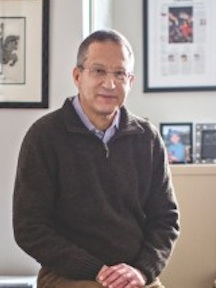By Gisely Ruiz
David Weiman (ΦBK, Brown University 1975) is the Alena Wels Hirschorn ’58 Professor of Economics and faculty director of Barnard’s innovative Empirical Reasoning Center. He is also one of fifteen Phi Beta Kappa Visiting Scholars who toured the country during the 2016-2017 academic year.
A leader in his field, Weiman specializes in 19th- and 20th-century US economic history and the political economy of contemporary US criminal justice policy. His current research focuses on the evolution of the US banking-monetary system from Jackson’s Bank War to the formation of the Federal Reserve. Among his most recent publications are “Political Limits to the Fed’s Goal of a Common National Bank Money” in Research and Economic History (2014) and “Main Street and Wall Street: The Macroeconomic Consequences of New York Bank Suspensions, 1866 to 1914” in the journal Cliobetrica (2013). Weiman has also written on the origins and labor market impacts of the regime of mass incarceration and is completing a book titled “Toward a More Perfect Monetary Union Unintended Consequences of the National Banking Acts,” coauthored with John A. James.
As a ΦBK Visiting Scholar, Weiman spends two days on each campus he visits, taking full part in the academic life of the institution. He meets informally with students and faculty members, participates in classroom discussions and seminars, and gives a public lecture open to the academic community and the general public.
Weiman offered three lecture topics for each institution to choose from: “What Is Money? A Historical Perspective,” “Jackson versus Hamilton: Monetary Union and the Struggle over Political Economic Sovereignty,” and “Barriers to Reentry? A Labor Market Perspective on Mass Incarceration.” The questions for this interview were developed in response to the third lecture on the social costs of mass incarceration and his analysis of the labor market viewpoint of released prisoners.
Weiman’s next stop will be April 20-21 at Grinnell College in Indiana. Contact the ΦBK Chapter at Grinnell for details about the public lecture he will give on their campus. He will end his tour at the University of Florida in the fall.
INTERVIEW
You are fundamentally an economist. How did your academic background shape your study of mass incarceration?
WEIMAN: Well, I like to think of myself as a “political economist” (and historian) who sees these issues in broader contexts than just demand and supply in the labor market. Still, I focus on the labor market, because it plays an integral role in explaining why individuals are more likely to commit less serious (economic) crimes and are more likely to return to prison after their release for a prior conviction. In the latter connection, the argument is about whether a prison record diminishes an individual’s labor market opportunities: 1) on the supply side, his/her information about jobs and value on the job; and 2) on the demand side, an employer’s assessment of the costs and risks of hiring an ex-prisoner. I also think that economic factors may help to explain why politicians advanced these get tough on crime policies, though this link is much more complex.
How would you define mass incarceration, and why is it such a prominent issue in the U.S?
WEIMAN: By mass incarceration, I am referring to the more punitive criminal justice policy regime in the US since the mid-1970s that has increased the likelihood of imprisonment and the length of prison sentences and time served notably for less serious offenses (such as drug possession/use and retail drug peddling). It is evident in the five-fold increase in incarceration rates (the number of prisoners per 100,000 people) since the mid-1970s (from around 100 to a peak of 500 in 2005). Besides increasing the overall prison population, these policies are notable for targeting young men (and increasingly women) of color living in disadvantaged communities. Consequently, serving time has become “normative” or the norm in many of these communities, reinforcing the marginalization of already disadvantaged populations.
The policy regime of mass incarceration raises fundamental concerns about social justice and especially persistent racial inequalities. Put more starkly, these policies—the laws, their enforcement, etc.—are racially biased. As recent research shows, “war on drugs” policies have taken a disproportionate toll on disadvantaged communities of color, yet survey data shows that young African American men and women are less likely to use illegal drugs than their white peers are. To add to this problem of selective enforcement, they tend to be discretionary, meaning that they are a matter of politics, not direct responses to increasing concerns about public safety.
A core issue in your study of mass incarceration deals with the racial disparity readily apparent in the prison system. How would you address this growing controversy in the U.S?
WEIMAN: Needless to say, the racial injustice in the US criminal justice system is NOT fundamentally a matter of criminal justice policy, though mass incarceration reinforces racial disparities and stereotypes. As I suggest, what’s called for is another “New Deal” (though without its racial inequalities) to address the deepening problems of economic, social, and political inequalities in the US today. Recall that the New Deal mobilized federal government resources (e.g.) to assist disadvantaged communities, to modernize essential public and economic infrastructures, to better workers’ wages and employment conditions, and to provide safety net insurance against the vicissitudes of modern life. Most unfortunately, the regime of mass incarceration has had perverse impacts, devastating disadvantaged inner city minority communities while providing opportunities in economically stressed, rural white communities from building and staffing prisons. Attempts to reverse course, needless to say, have run into political resistance in precisely those communities, which depend on prisons for their economic livelihood. Clearly, there’s got to be a better, more equitable way to improve the standard and quality of life for all.
Gisely Ruiz is a history major at the University of California, Riverside. UC Riverside is home to the Iota of California Chapter of Phi Beta Kappa.




